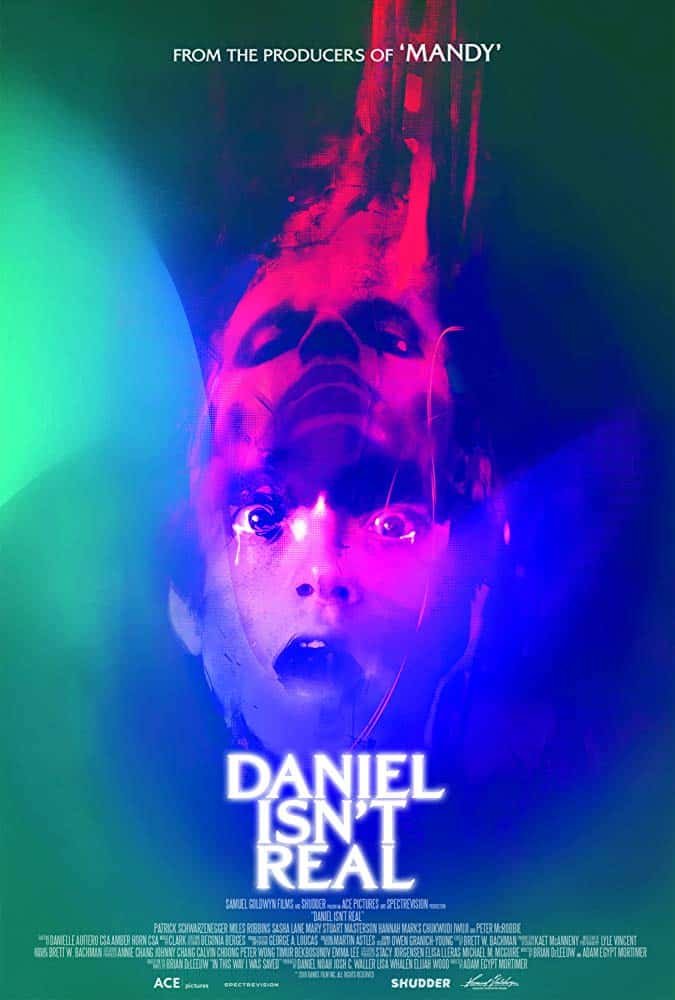
Daniel Isn’t Real was introduced as ‘a cross between Drop Dead Fred and Hellraiser’; if you are immediately wondering how that could ever play out, then rest assured, this is as good an approximation as you are likely to get. This film is incredibly dark throughout, threaded through with ambiguities which grow the more you think about them, and at heart it’s also an incredibly sad film, with few moments of respite. It is also, as the first sentence of this review would suggest, a film about an imaginary friend – albeit that this theme is itself full of ambiguity.
We first meet Luke as a small child, whilst he’s witnessing the live-action breakdown of his parents’ relationship (a compelling scene which reminds us of the often hellish vulnerability of being a child). As they argue, Luke slips unseen out of their apartment and wanders straight into the aftermath of a brutal, apparently unprovoked mass shooting at a nearby diner. Hey, it’s a busy day for storing up trauma. As Luke looks on, dumbfounded, another little boy appears at his side and asks him if he wants to play. Happy to get away from the domain of adults – which seems to be riddled with bitter recriminations, misery and bullets – Luke readily agrees, and the two boys go off together. This is Daniel, who instantly becomes Luke’s best friend. But it isn’t all innocent fun; one day, Daniel incites Luke to spike his mother’s drink with medication, insisting it’ll give her ‘super powers’. It does not. From the depths of what’s probably a near-fatal poisoning, Luke’s mother has a moment of clarity. She finds what her son has done and insists that he locks Daniel away; Luke does this by commanding his friend into a dolls’ house, which he then locks.
We skip forward in time: Luke has grown up and left home to go to college, but his mother’s mental health – always erratic – has worsened considerably, meaning that he has to make frequent trips home to check up on her. This contributes to his sense of profound isolation from his peers. One day, as he grapples with what it is which makes him different, and what happened in his childhood to set him on this path, he decides to open the dolls’ house. Daniel reappears – now the same age as Luke – and at first, seems to be just the man to ease Luke’s social anxieties. Daniel is confident where Luke is shy; he’s clever, he knows just what to do or say, and he’s omnipresent. Of course, his attentions aren’t obviously benign for very long, and Luke must fight hard to retain control and agency in his life, a hard fight which this damaged young man is ill-equipped to face.

The idea of the malign imaginary friend could so easily be construed as just another riff on mental illness, another means of displaying outwardly what is going on inwardly, and of course the film tackles this notion head on because a film set in the modern world could hardly not do so, with therapists, well-wishers and Luke himself categorising ‘Daniel’ in just this way. However, were Daniel Isn’t Real to start and stop here, with a big reveal that Daniel is not in fact Real, it would not be the well-realised film we actually get. Other ideas are interwoven into the narrative – none of which are ever fully resolved, leaving the audience to ponder what they’ve seen. Could Daniel have his origins in supernatural phenomena? Could those supernatural phenomena themselves belong to different mythologies? You won’t get to the end of the film and feel these questions have been resolved; this is definitely one of the film’s key strengths. I didn’t feel that the writers simply left a gap in the narrative where they ran out of answers, either, as has happened with other films. Here, the film’s refusal to neatly tie everything up worked well as a facet of the plot.
What is beyond doubt, though, is the acute sense of inescapability here, as a young man does what he can to control his own actions but seems scuppered at every turn by someone more able, more together than he is. This effect is achieved fantastically well by the two leads, each of whom comes from a family with a fair bit of experience in acting (Miles Robbins, playing Luke, is the son of Tim Robbins and Susan Sarandon; Patrick Schwartzenegger, playing Daniel – well, I gather his dad is in the business, too). Robbins is fantastic as the likeable, but deeply damaged and vulnerable Luke whilst Schwartzenegger is placidly sinister as Daniel – until someone tries to resist him, that is.
But then, there’s that ambiguity again: is Daniel actively trying to destroy Luke? Or is he just doing what he thinks is for the best, with the proviso that he’s prioritising his own needs and desires? After all, how many millions of humans have done and are doing the same thing right now? The road to hell may indeed be paved with good intentions. In any distillation, this is a film which is tough viewing on its own terms. Whilst I felt that some of the replayed scenes from childhood were weaker than the rest because they were decidedly unambiguous, overall Daniel Isn’t Real is a challenging, uncomfortable watch. As an exercise in well-honed brutality, it’s a success, albeit a success which comes via a bitter sense of powerlessness.
Daniel Isn’t Real screened as part of the Mayhem Film Festival in Nottingham, UK in October 2019. It receives a US release on 6th December 2019.
